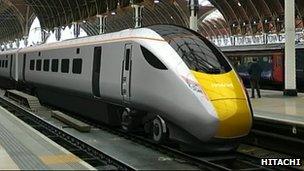Great Western high-speed trains set for Thames Valley
- Published

The high-speed trains will replace a fleet of trains from the 1970s
A £4.5bn contract has been signed to introduce high-speed trains on the Great Western Main line through the Thames Valley.
The government has agreed a deal with Hitachi - which operates bullet trains in Japan - to provide the new trains by 2017.
First Great Western says journey times will be cut and more seats created.
However Bob Crow, general secretary of transport union RMT, said the trains should be made from scratch in the UK.
The trains will replace a fleet of InterCity trains from the 1970s on the Great Western Main line through Oxfordshire and Berkshire, and also on the East Coast Main Line.
First Great Western managing director Mark Hopwood said: "This latest government announcement is an essential piece of the jigsaw in improving passenger journeys across our network.
"Alongside the further electrification announced last week, these trains will give passengers a faster and more comfortable journey when travelling on the Great Western Main Line between London and destinations such as Oxford, Newbury, Bristol, Cardiff and Swansea."
He said journey times will be cut by up to 21 minutes.
'Botched and delayed'
Under the deal, Agility Trains, a consortium led by Hitachi, will assemble 596 rail carriages at a new factory in Newton Aycliffe, County Durham.
Agility was announced as preferred bidder for the Intercity Express Programme (IEP) in early 2009, but after a series of delays, it has taken more than three years for the deal to be finalised.
The first trains will enter service on the Great Western Main Line in 2017 and on the East Coast Main Line by 2018.
The government has said the investment will create 900 jobs.
Bob Crow, general secretary of the RMT union, said: "While any new jobs are welcome, this whole botched and delayed intercity replacement programme could have generated thousands of skilled manufacturing jobs if the trains had been built from scratch in the UK rather than just assembled in kit form shipped from Japan."
- Published25 July 2012
- Published10 January 2012
- Published26 May 2011
- Published26 November 2010